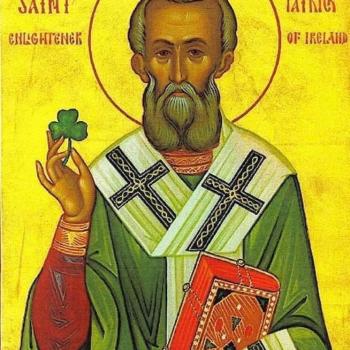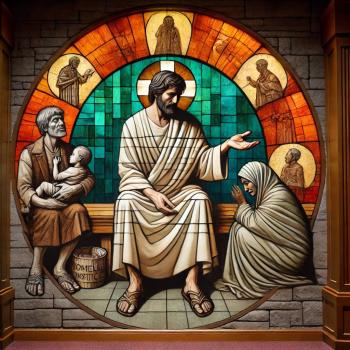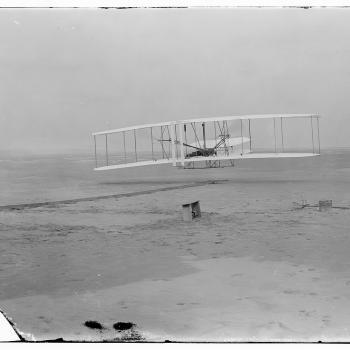Much like the shepherds during the first Christmas, people around the world had their attention turned toward the heavens 47 years ago tonight, when the astronauts of Apollo 8 delivered their famous Christmas Eve broadcast from lunar orbit.
But on Christmas Eve, Dec. 24, 1968, Apollo 8, the first manned mission to the moon, entered lunar orbit.
Commander Frank Borman, Command Module Pilot Jim Lovell, and Lunar Module Pilot William Anders became the first humans to orbit the moon, and the first astronauts to spend Christmas in space.
To mark the occasion, they sent Christmas greetings and live images of the moon back to their home planet and read from the Book of Genesis. It was estimated that as many as one billion people watched the historic broadcast or listened on the radio.
As the world looked at images of the Earth and the moon seen from Apollo 8, Jim Lovell said, “The vast loneliness is awe-inspiring and it makes you realize just what you have back there on Earth.” They ended the broadcast with these words.
William Anders said, “For all the people on Earth the crew of Apollo 8 has a message we would like to send you. In the beginning God created the heaven and the earth. And the earth was without form, and void; and darkness was upon the face of the deep. And the Spirit of God moved upon the face of the waters. And God said, ‘Let there be light:’ and there was light. And God saw the light, that it was good: and God divided the light from the darkness.”
Jim Lovell read next, “And God called the light Day, and the darkness he called Night. And the evening and the morning were the first day. And God said, ‘Let there be a firmament in the midst of the waters, and let it divide the waters from the waters.’ And God made the firmament, and divided the waters, which were under the firmament from the waters which were above the firmament: and it was so. And God called the firmament Heaven. And the evening and the morning were the second day.”
Frank Borman read, “And God said, ‘Let the waters under the heavens be gathered together unto one place, and let the dry land appear:’ and it was so. And God called the dry land Earth; and the gathering together of the waters called he Seas: and God saw that it was good.” Borman then added, “And from the crew of Apollo 8, we close with good night, good luck, a Merry Christmas, and God bless all of you – all of you on the good Earth.”

Imagine you’re a shepherd, alone on a dark and starlit night, watching over your sheep. All is calm and all is bright. The only sounds are the sheep quietly calling to one another.
Suddenly an angel appears and says that something beautiful has been revealed in a small child, wrapped in swaddling clothes, lying in a manger. You make your way to Bethlehem to see this child, and when you look into his eyes, you see your own reflection. You see all of humanity, in the eyes of the newborn child. You realize that you were present in the baby even before you arrived, and in someway, he was present in you, too.
Eventually you make your way back home. You’re standing again in the field, keeping watch over your flock. The first colors of the morning sun slowly chase away the darkness.
Another shepherd walks up and asks you where you’ve been.
“I was in Bethlehem,” you say.
“What did you see?”
“I saw the hope of the world.”
“What does it look like?”
“It looks just like you and me.”

Luke 2:4-14
In those days a decree went out from Emperor Augustus that all the world should be registered. 2 This was the first registration and was taken while Quirinius was governor of Syria. 3 All went to their own towns to be registered. 4 Joseph also went from the town of Nazareth in Galilee to Judea, to the city of David called Bethlehem, because he was descended from the house and family of David. 5 He went to be registered with Mary, to whom he was engaged and who was expecting a child. 6 While they were there, the time came for her to deliver her child.7 And she gave birth to her firstborn son and wrapped him in bands of cloth, and laid him in a manger, because there was no place for them in the inn. 8 In that region there were shepherds living in the fields, keeping watch over their flock by night. 9 Then an angel of the Lord stood before them, and the glory of the Lord shone around them, and they were terrified. 10 But the angel said to them, “Do not be afraid; for see—I am bringing you good news of great joy for all the people: 11 to you is born this day in the city of David a Savior, who is the Messiah, Christ the Lord. 12 This will be a sign for you: you will find a child wrapped in bands of cloth and lying in a manger.” 13 And suddenly there was with the angel a multitude of the heavenly host, praising God and saying, 14 “Glory to God in the highest heaven, and on earth peace among those whom he favors!”
A familiar scripture describing this familiar time. Verses many of us have heard, many, many times. A simple story of a child born in a manger because there was no room at the inn. So simple, many children in church can explain it to you.
But on another level, in a contemporary context– for the people reading the original copy of the Gospel according to Luke –there are countless scriptural references to Old Testament prophesy.
A child born in Bethlehem, a descendant from the house of David, born of a virgin, wrapped in bands of cloth – all simple for us to understand, but of significance to the Jewish people for whom this was written. All these are messages from Jewish scripture, helping the people of Israel to recognize the messiah, as described in prophecy.
There are two levels . . . the level we read, and the level at which it was written. Just as there are two levels to our lives . . . the level we wish we were, spiritually, emotionally, perhaps physically. And the level where we really are.
There is the level of God, creator of the heavens, the earth and moon, and God incarnate, a helpless infant.
Those shepherds were at one level, standing alone in a field, and suddenly they found themselves at a completely different level . . . in the presence of God.
The shepherds returned to their flocks, to their jobs and homes and friends and families – but they returned changed men.
The shepherds, like the astronauts, have seen beyond themselves – to glimpse the presence of God.
Some people saw this simple day laborer, traveling with a young woman and her young child, and they thought nothing of it. Just as others saw the miracles performed by Jesus of Nazareth, and they thought nothing of the miracles, and nothing of the man they encountered. They weren’t changed, because they encountered a man on only one level – on the level they expected.
A baby is just a baby, a man is just a man, that’s all you’ll see, if you’re not looking for the presence of God. But once you see the presence of God in the baby, in the manger, in the eyes of everyone you meet, in all of the earth from the view of a spacecraft, you never forget who God is.
Through Christ, God entered into the world in a new and different way, to give us a new and different way of living. From the farthest reaches of space, to the closest blade of grass on a hillside under the feet of a shepherd, God is there.
“Glory to God in the highest heaven.” Glory to God, who sent a redeemer to redeem creation. Glory to God who sent a light into the darkness of this world.












